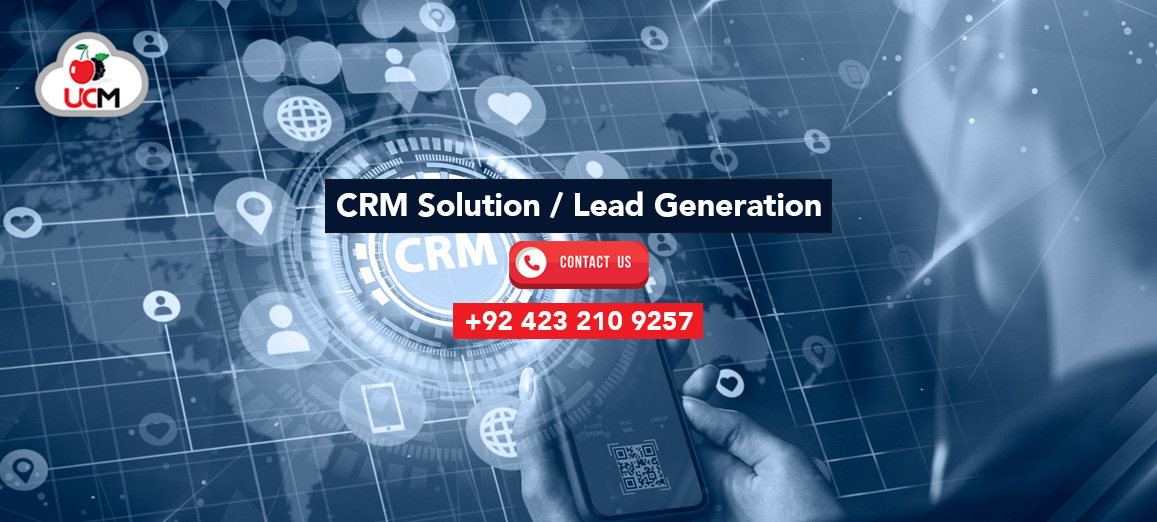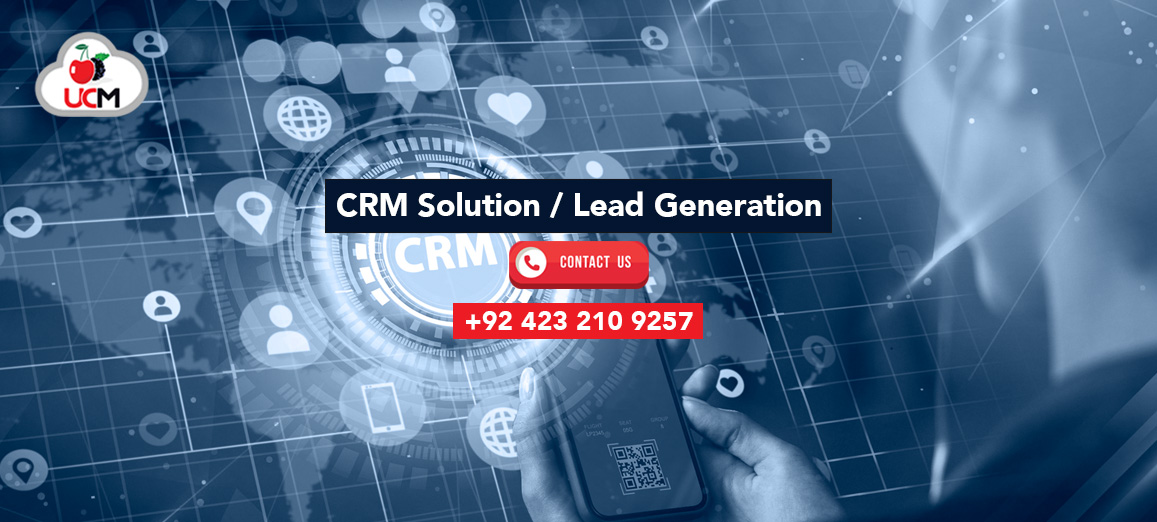CRM Software in Pakistan : Here’s Why You Need it to Scale your Business
Owing to the increasing use of technology to streamline operations and improve customer experience, there has been a rise among businesses adopting Customer Relationship Management (CRM) software. CRM software is paramount in pushing businesses to new heights. CRM software works on the principle that engaged customers stay, and revenue multiplies each day! This guide delves into how CRM Software in Pakistan can help a business manage its customer data and relations.
How CRM Software in Pakistan is Transforming the Restaurant Industry
Lately, there has been a rise in the adoption of CRM software among various companies in Pakistan. This trend is attributed to numerous underlying factors. Here are a few reasons supporting the increasing use of CRM software in Pakistan:
-
Changing Customer Preferences
In this era of the Internet, customers demand a more personalized experience. Customers are used to getting what they want whenever they want it, so businesses naturally expect to understand their needs and preferences. CRM software offers tools to collect, analyze, and use customer data to deliver tailored solutions. Furthermore, customers now expect prompt and efficient service, which has increased the use of CRM software among businesses.
-
Changing Trends
One of the main top trends guiding the CRM market is the increasing adoption of cloud-based software which proves to be more cost-effective and easier in terms of user interface. Whether it is a small or multinational company, the use of cloud-based CRM software. Yet another leading trend is the use of artificial intelligence (AI) and Machine Learning (ML) in CRM software. This helps to automate tasks, reduce errors, and streamline many monotonous daily tasks.
-
Local Competition
The Pakistani market is flooded with small and medium-sized enterprises that often demand the use of cost-effective solutions to help them compete at the national level. Cloud-based CRM is particularly suitable for these companies and hence is contributing to the increased use of the Best CRM Software in Lahore.
What is CRM, and Who Can Use It?
CRM software handles and manipulates customer data collected from interactions with representatives by making purchases, seeking services and proposals, and using company assets. The system then lets companies access that data and use it to understand customer preferences, market trends, and company progress. The software also helps to develop a complete customer profile upon which a customer relationship is built.
Furthermore, CRM software offers tools and features to improve customer engagement, increase sales, and develop stronger customer relationships, all leading to an increase in revenue and profit generation.
CRM software is a powerful solution for companies to manage customer relationships and improve their services. Every enterprise offering a product or service to customers can use this software to streamline its processes and improve customer relationships. By collecting customer data and understanding customer behavior, companies can sell new products at the right time to increase their chances of success.

world no 1 CRM software big software companies in Pakistan number 1 CRM software CRM companies in Pakistan CRM Pakistan what is CRM software in Pakistan what are the best CRM software CRM jobs in Pakistan CRM jobs in Karachi CRM software in Pakistan Pakistani companies using CRM what is CRM in web development crm examples in Pakistan
How Does CRM Software in Pakistan Work?
What is CRM software used for? Customer relationship management software offers such tools and features to improve customer acquisition and retention. The following are how CRM software helps to develop and improve customer relations.
-
Address Basic Queries
The CRM system collects customer data at various touchpoints and analyzes it to understand customers better and thus helps to answer their queries and concerns. It provides tailored solutions to each customer’s preferences and likes.
-
Handle Customer Records
The software properly organizes customer data and allows company representatives to access it whenever needed. The stored and analyzed data is also shared with the sales and marketing teams to optimize and improve their customer engagement and marketing strategies for building better relationships.
-
Automate Sales Flow
The software, by automating most of the tasks, streamlines daily tasks and increases efficiency. Furthermore, the integration of AI and ML to analyze customer data helps to increase sales and generate revenue and profits.
-
Tailor Marketing Strategies
The multiple channels through which customers engage with companies and their products and services are various touchpoints for customer interactions, which can be directly or indirectly controlled by CRM software. By using data from CRM software, marketing teams can unify their efforts to deliver tailored solutions to customers and build stronger relationships.
How AI is Revolutionizing CRM: The Future of Customer Relationships
The integration of AI and automation has improved daily tasks. One of the many benefits is providing robust analytics coupled with market dynamics. Leveraging its powerful features, it is now believed that AI is the future of customer relationship management. Its predictive abilities help companies to decide their next best action and stay competitive in the market. AI also delivers timely customer intelligence to optimize customer experience across marketing and sales. AI also helps to make interactions smarter, faster, and more personalized. AI-driven CRM software automates tasks and personalized marketing to develop stronger relationships and increase loyalty.
Choose the Right CRM; Reach Out Now!
In conclusion, at Cherry Berry UCM, we realize the importance of customer service for a company and strive hard to deliver exceptional service. We offer the Best CRM Software Services in Pakistan with greater personalization options for you to tailor it according to your company requirements. Sign up today for cloud-based software that will push your business to new heights of success. With our software, get insights and sell smarter to serve your customers exceptionally and best crm software in pakistan.
Shaping the Future: Key Trends in Outbound Call Center Services for 2025
Call centers are one of the most successful ways to reach customers. This is why more than 7,500 call centers exist in the US alone. In Pakistan, the Call Center industry is emerging as a significant contributor to the Country’s economic growth, generating over $2 billion in 2023.
Research has shown that call centers that proactively reach their customers have greater ROI and build stronger relationships with them. When proactively contacted, 92% of customers perceive brands positively.
If you provide outbound call Center solutions for businesses, you often wonder what differentiates you from your competitors. The answer is nothing but quality customer service. Fortunately, the right technology can provide a seamless customer experience in any industry.
So, call centers must invest in top technological trends and tools to sharpen their competitive edge and drive ROI. Companies offering outbound call center services must adapt and scale their strategies to stay competitive. Here are the top trends to look out for in 2025.
Artificial Intelligence (AI) & Automation are Gaining Momentum
Research revealed that 79% of call center leaders plan to invest in AI tools in the coming years. Are you one of them? If yes, you will be among the most successful businessmen, as a study by Grand View Research revealed that the global call center AI market is expected to reach USD 7.08 billion by 2030. AI and automation are no longer seen as just another hype of technology but as the future of lead generation call centers. The following are the most popular trends in the call center AI market.
-
AI-Powered Voice Bots
AI-powered voice bots, also called AI voice agents or AI virtual agents, are at the top of call center automation trends. Undoubtedly, one of the most successful innovations in the call center industry is incorporating AI into human capabilities in a hybrid model to get the most out of both.
These voice bots are based on technologies like Automatic Speech Recognition, Natural Language Processing, Natural Language Understanding, and Natural Language Generation. These technologies enable bots to engage with callers and respond quickly and accurately. You must see this as an opportunity to change, as the world is rapidly moving towards integrating AI-powered solutions in their businesses.
-
Conversational AI Chatbots
Like AI voice bots, chatbots provide a more accessible customer experience. A study by Gartner revealed that by 2027, chatbots will be the primary channel for customer service in around a quarter of organizations. Chatbots are getting increasingly popular as they excel in answering simple questions and resolving basic queries.
With conversational AI chatbots call center services are now more accessible for customers with round-the-clock availability. However, HubSpot revealed that 62% of consumers would rather talk to a human representative when they have complex questions. This means AI voice bots and chatbots cannot handle all inquiries, and upon receiving a complex issue, they instantly elevate the interaction to a human agent.
-
AI Predictive Auto-Dialing
You would not argue that manual sifting and dialing are tedious and error-prone jobs. Predictive dialing is a powerful technology that is increasingly used to provide outbound call center services. Grand View Research reveals that its market size is expected to reach USD 12.2 billion by 2028. This trend is not just boosting agent performance but is also adding value to the customer experience.
Predictive auto-dialling software automates making outbound calls to a list of customers. However, with AI integration, predictive dialling technology uses ML algorithms to predict the availability of agents and adjust the dialling pace automatically. So, by using this tool, outbound call center service providers can minimize idle time, enhance agent productivity, and boost the efficiency of outbound call centers.
-
AI Speech Analytics
Yet another trending technology in the call center industry is AI-driven speech analytics. This tool monitors calls and evaluates the quality of interactions in real time, which means you can now get better insights into your agents’ performance. This powerful tool helps analyse customer sentiments and assess customers’ feelings while interacting with your representatives. By generating post-call summaries, you can evaluate the overall quality of interactions and take steps for improvement.
One crucial aspect of Inbound call center Software is the ability to analyse customers’ frustrations and train representatives to deal with them. AI speech analytics can provide insights into customer behavior, preferences, and frustrations. This way, you can proactively prevent customer dissatisfaction, which is a significant loss for call centers. According to McKinsey, using speech analytics helps improve customer satisfaction scores by 10%.
-
Sentiment Analysis
Another AI-driven tool that is gaining popularity and is likely to emerge as the fastest-growing trend in the call center AI market is sentiment analysis. Lead generation call centers can now assess customer emotions during interactions using this tool and provide tailored solutions. The technologies behind this tool are NLP, machine learning, speech recognition, text analytics, and sentiment scoring algorithms.
Call center outsourcing services use this technology to focus on understanding customers’ emotional states and providing a more personalised response. This improves customer satisfaction and boosts loyalty.
-
AI-Generated Call Summary
The powerful capability of AI enables the generation of summaries during calls to eliminate the need for manual note-taking. This provides a written context for every conversation, thus allowing representatives to offer more customised feedback to the customers.
It can highlight key discussion points, action items, and other valuable insights. With each solution, you can better assess the quality of customer interaction and thereby make improvements. Most outbound call solutions utilise this tool to improve customer interactions, representative efficiency, and operational flow.
The Continued Popularity of Omnichannel Communication
The idea of omnichannel communication became popular years ago. Even in 2025, it is a powerful way to offer the convenience customers demand when engaging with the brand, making it an essential approach that call centers cannot afford to miss. Its continued popularity is heavily based on customers’ preference to use multiple platforms to reach out to brands rather than simply making phone calls. If your outbound call center services are based on calls or SMS to reach out to customers, you are missing out on an essential tool to stay competitive.
Using multiple channels to establish connections with your customers has only become more important now, especially with issues like call blocking on the rise. You can leverage the omnichannel software to integrate multiple channels into one comprehensive and central hub. This allows agents to easily switch between different channels based on the channel the customer is using. In addition, this trend continues to add value to both customer satisfaction and agent performance.
Cloud Migration or Cloud Calling
Although omnichannel communication has an increasing demand and AI is ruling everything, calls are still the preferred channel for many. However, like all other businesses shifting their infrastructure to the cloud, call centers are no exception.
Implementing cloud-based call centre software powered by Voice over Internet Protocol (VoIP) allows call centres to shift to digital infrastructure without sacrificing voice calling. Cloud calling requires only an internet connection rather than landlines, PBX systems, or cables. Cloud migration allows agents to make virtual calls over the internet using any web-assisted device.
Cloud calling can be integrated with AI to reduce background noise and jitter and deliver a high-quality calling experience. Cloud migration enables call centers to scale their operations and handle an increased call volume more efficiently.
Conclusion
To conclude, the key trends in outbound call center services in 2025 focus on combining AI with human capabilities. In providing exceptional outbound call solutions for businesses, AI-based tools such as voice bots and chatbots, AI-assisted predictive dialing, and sentiment and speech analysis continue to enhance operational efficiency. Meanwhile, human agents resolve complex problems and provide empathetic solutions. Call centers must balance technology and skilled professionals to deliver exceptional services. If you are looking for the best outbound call center for lead generation, consider CherryBerry UCM. We use the latest technology and tools to streamline your business operations, improve customer relations, drive sales, and generate profits.
Frequently Asked Questions
-
What is Call Center Automation, and How is it Helpful?
Call Center Automation means implementing technologies like AI and Machine Learning, Natural Language Processing, and Robotic Process Automation to simplify and optimize existing processes. This, in turn, eliminates or significantly reduces the need for human intervention.
-
What are the Key Benefits of Using Contact Center Automation Tools?
Call centers can offer 24/7 customer support, increase sales and revenue, and reduce operational costs and human errors by automating operations. This leads to greater customer satisfaction and profit generation.
-
Why is Outsourcing to Call Centers Important?
By outsourcing to call centers, companies can focus on their core competencies while delivering exceptional customer experiences. Call centers have trained agents who excel at providing an excellent customer experience. They use the latest tools and technology to automate processes and increase operational efficiency.
-
How is AI Changing the Call Center Industry?
AI in call centers is redefining operational efficiency and customer experience. From being readily available to offering personalised interactions, AI-powered solutions boost customer satisfaction. By automating mundane tasks and centralising information, AI is improving the operational efficiency of call centers.
-
What is the Future of Outbound Call Center Services?
Outbound call center services enhance customer experience using AI-driven tools, including virtual assistants, predictive analysis, speech, and sentiment analysis. Call centers strongly emphasize providing personalised interactions to meet diverse customer needs.
-
What are Customers Expecting from Lead Generation Call Centers in 2025?
Customers in 2025 demand a proactive reach, personalised and omnichannel communication. 2025 is all about enhancing customer experience, which can be made possible by using AI-integrated tools like chatbots, voice bots, sentiment, and speech analytics.
Which Benefits Does A Cloud-Based Calling Software Offer?
Your strategic hub for phone-based customer interactions is Cloud-Based Calling Software, as its whole architecture is hosted on the cloud. With this technology, organizations can easily handle high call volumes from any location while combining the advantages of flexibility, scalability, and cost-effectiveness—benefits that are much beyond those of traditional onsite solutions.
Why Are Cloud-Based Calling Software Preferable Over The Traditional Ones?
- Seamless Expansion
Software for call centers has a remarkable level of scalability. Whether your company is expanding or contracting, the cloud-based approach can swiftly adapt to meet your requirements. In contrast, traditional call centers need to make major infrastructure upgrades in order to grow or shrink.
- Economical Operations
Hardware, software, and upkeep are investments needed for traditional contact centers. However, because cloud-based call center technology is pay-as-you-go, it is far less expensive.
- Location Adaptability
Cloud solutions are not restricted by location. With a reliable internet connection, your staff may answer calls from any location in the globe, creating opportunities for remote work and worldwide customer support coverage.
- Quick Deployment
In a conventional call center, call center software setup might take several months. Cloud alternatives make deployment quick and easy. Your staff may be operational in a matter of days, enabling prompt reaction to market fluctuations.
- Increased Protection
Strong security features, such as data encryption and regular backups, are provided by virtual call centers, guaranteeing the protection of your customers’ information. For comparable levels of safety, traditional call centers would need to make additional investments.
- Simplified Incorporation
Your current CRM and other company tools may be easily integrated with cloud-based contact centers. This results in better service quality and effective information exchange, which might be more difficult with conventional arrangements.
- Superior Recovery From Disasters
Since data is safely kept in the cloud, virtual solutions may continue operating with minimum disturbance in the event of natural disasters or power outages. In contrast, traditional call centers are more likely to have downtime in these kinds of situations.
- Ecologically Favorable
And last, virtual call centers help create a company model that is more resilient. When compared to traditional contact centers, they minimize your carbon footprint because they use less energy and physical infrastructure.
Advantages That Cloud-Based Calling Software Offers
Contact centers nowadays are only as good as the technology that powers them. No matter how complex your service offerings are or whether your business primarily handles inbound or outgoing calls, cloud-based call center software offers all of these advantages.
1 – Savings On Costs
There are several benefits to a cloud-based phone system, but for many organizations, the biggest one is the financial savings. One of the main draws of a platform is its affordability in comparison to traditional systems, even when it has a lot of software capabilities. Initially, a cloud contact center eliminates a lot of the hardware needed for older systems.
Cloud-based phone systems operate on a pre-existing infrastructure, saving the need to set up a whole local infrastructure specifically for handling a new call center solution. There are significant savings in the setup and total implementation time, which translates into lower out-of-pocket costs.
The efficiency of sales teams may be enhanced with cloud-based call center phone systems that include features like live call monitoring, call routing, and CRM connection. The efficient operation of your live agents is facilitated by each of these technologies since even the most sophisticated call center software is insufficient to manage a contact center. Your employees are equally crucial to their success, and when you use the appropriate platforms, you provide them with all the resources they need to perform their tasks well.
2 – Flexibility
Scalability, one of the most crucial aspects of the contemporary company, is another quality that Cloud-Based Calling Software provides. Business demands will change over time in practically every call center environment. For example, if your business offers trip insurance or motorboats, you could receive more calls from potential customers during the summer. Should you have to pay all year round for the substantial infrastructure that your company phone systems require in the summer? That is precisely what purchasing a conventional on-site call center would entail.
What occurs if your business expands? The right hardware is required even for the most basic call center software functionality, and scaling up with on-site gear can get expensive if your company’s demands exceed what your system can handle. Simply said, a cloud-based call center phone system doesn’t have this problem. One of the main advantages of cloud technology has always been scalability, and contact centers are no different from other businesses in this regard.
3 – Dependability
Nothing compares to a cloud-based contact center phone system when it comes to dependability. Less gear on location means that any major local interruption is less likely. Naturally, technology is never flawless. In light of this, how distinct are cloud contact centers from their more traditional counterparts?
Of course! This applies to all cloud-based technologies. Downtime can result in serious disruptions and serious problems with customer service for a company that operates busy contact centers. Because cloud technology places a strong emphasis on security and has excellent infrastructure, your business won’t have to worry as much. Because let’s face it, unreliability would render even the most sophisticated call center software useless.
4 – Enhanced Client Support
A lot of things can be done with the best call center software. The options are practically limitless, ranging from handling client data to forwarding calls to the appropriate department. Almost all features ultimately aim to enhance client interactions. This is where cloud contact centers shine. Even with simple call routing and interactive voice response (IVR) taken into account, customers spend less time on the phone resolving difficulties. Self-service solutions let individuals swiftly undertake simple tasks if they are called upon.
Of course, there are instances when callers just want to speak with a human person or have more complicated problems. Using natural language processing on some systems, a cloud-based IVR system may identify this need rapidly and route customers to the right department. Your clients will always have access to a friendly live support representative since Cloud-Based Calling Software also increases employee productivity.
5 – Adaptability
More flexibility is another benefit that cloud-based phone systems have over traditional company phone systems. It is as different as day and night. Employees may operate from much more devices with greater freedom thanks to cloud technologies. One may work from notebooks, laptops, and cellphones instead of needing to spend the entire day in front of a computer. The dangers associated with a distributed workforce, such as insider threats, carelessness, and unstable work-from-home infrastructure, can be lessened with the use of cloud-based contact center solutions.
Furthermore, cloud-based solutions provide the ability to operate remotely. We discovered how advantageous remote staff management can be during the epidemic and the Great Resignation. Not only does this help your agents, but it also has significant benefits for your business. For example, research continuously demonstrates that employees who work remotely are happier and more productive than those who work in offices. Imagine a future where your agents can answer incoming and outgoing calls from any location without negatively impacting the client experience. That is precisely what may be provided via a cloud-based phone system.
What’s Next? Find The Right Cloud-Based Calling Software Near You!
There is no denying the advantages of cloud-based call center software. A cloud contact center offers more than you could ever ask for, whether it’s because of its many amazing capabilities (such as natural language processing and interactive voice response) or its flexibility in providing customers with a personalized experience. How can you be sure you’re making the proper decision when there are so many possibilities available?
First things first: finish your assignment. To see how successful our cloud-based solutions can be at enhancing customer service and more, you can arrange a demo with CherryBerry UCM right now. We provide alternatives to suit your needs, regardless of whether your Cloud-Based Calling Software requirements are as basic as managing incoming and outgoing calls or you want a system that can handle incoming calls utilizing artificial intelligence technology.
Exploring the Global Trends of Call Center Outsourcing
The Emerging Trend Of Call Centre Outsourcing
There has been an increasing trend in outsourcing to call centres and this emerging trend reflects a dynamic shift in business strategies. Companies nowadays increasingly leverage external expertise to enhance their customer service and operational efficiency. Organizations have recognized the value of outsourcing to access specialized skills, advanced technologies, and cost-effective solutions. This trend is driven by the globalized marketplace, where businesses seek to stay competitive and agile. Furthermore, the integration of AI and automation has reshaped the outsourcing landscape, enabling companies to provide faster and personalized services. As the industry evolves, the focus has shifted from cost-effective techniques to delivering enhanced customer experiences. One effective and widely used means is call centre outsourcing partnerships. Today, the need to outsource to call centres has become imperative for companies aiming to elevate customer experiences. Read this blog to find out more about call centre outsourcing services of Cherry Berry UCM.
What Are The Benefits Of Call Centre Outsourcing
The rapid technological advancements of this era, outsourcing facilitates the integration of cutting-edge technologies to further augment the efficiency and effectiveness of customer interactions. Call centre outsourcing is a strategic move to stay competitive, agile, and focused in this competitive business landscape. For several reasons, outsourcing has become important for companies.
-
Global Availability
Call centres today enable your company to achieve a global presence by providing 24-7 services and utilizing the power of the internet. Transcending all global barriers, call centres ensure your company stays competitive in the global market.
-
Technological Advancements
By outsourcing to call centres, you gain access to specialized skills and services that also include utilization of cutting-edge technological advancements. Call centre agents make use of the latest technologies such as AI to enhance efficiency.
-
Enhanced Customer Services
By providing robust services and 24/7 availability of agents to respond to customer queries and concerns, call centres are a means of enhancing customer interaction and improving relationships. Using best practices to contribute to positive and consistent experience.
-
Scalability
Call centre outsourcing is highly flexible and scalable. It evolves as your business and market trend evolves. Dealing with the fluctuations in call volumes, the agents are skilled at providing quality services. They make sure to provide consistent services even during peak hours.
-
Cost Effectiveness
Outsourcing to call centres greatly reduces the cost of companies. This is because call centres provide experts, 24/7 availability, global reach, evolution to market trends, flexibility in services and yet enhanced operational efficiency.
Call Center & Customer Care Services
Call centres play a pivotal role in shaping and nurturing customer relationships today. Serving as the frontline of communication, call centres serve as a direct link between businesses and their customers. Agents having expert skills are tasked with addressing inquiries, resolving issues, and providing essential information to customers. Through personalized interactions and timely responses, call centres build a positive brand perception and enhance relationships. Well-trained agents not only resolve problems but also proactively engage with customers, fostering a sense of trust and loyalty for the company. The quality of interactions closely ties with the effectiveness of call centre services, influencing the overall experience. The agents provide robust and efficient responses to customers and cater to their queries and concerns on time. By implementing a system of feedback, call centres improve their services and your brand’s reputation. You can consult Cherry Berry UCM for their well-known call centre outsourcing services.
Conclusion
Today, the fast-paced and competitive business environment requires businesses to stay nimble, customer-focused, and operationally efficient. This is done by utilizing the call centre outsourcing services which has become a strategic necessity for businesses. Visit Cherry Berry UCM website now and benefit from their call centre outsourcing services now.
Online Lead Generation Services For Elevated Performance
Why Do You Need Online Lead Generation Services?
Lead generation serves as the cornerstone of successful marketing strategies, acting as the catalyst that transforms potential customers into engaged and qualified prospects. This is the era of digital interactions and so effective lead generation has become a linchpin for businesses across various industries. By providing businesses with a steady stream of high-quality leads, these services are aimed at empowering organizations to focus their efforts on nurturing relationships and maximizing conversion rates. This ultimately leads to increased revenue and sustained business expansion. As businesses navigate the intricacies of this digital age, Online Lead Generation Services emerge as indispensable partners in the journey towards sustained growth and market dominance. The need for lead generation is dynamic and has become an integral facet of contemporary marketing. It allows companies to not only expand their customer base but also build lasting connections that drive sustained growth.
What Are The Online Lead Generation Services?
Online lead generation services are pivotal in the modern business landscape. Efficient lead generation serves as the driving force behind a company’s growth and success. In an era where competition is fierce and attention spans are limited, the ability to connect with customers and convert them into qualified leads is paramount. There are companies providing online lead generation services. They employ a diverse range of tactics and strategies to improve customer relationships. Leveraging digital marketing, data analytics, and engaging in targeted outreach is what these services are about. Lead generation is aimed at identifying and engaging with prospects who are most likely to become valuable customers. These services include a combination of targeted marketing efforts, compelling content, and strategic engagement. These are some ways businesses can capture the attention of their target audience, nurture relationships, and ultimately convert leads into loyal customers.
What Are The Perks Of Using Online Lead Generation Services?
The Internet today has transformed the way consumers discover, evaluate, and engage with products and services. This makes online platforms the primary arena for business interactions in this digital landscape. Consequently, this has completely taken over the traditional methods of lead generation as they become insufficient to meet the current challenges of this dynamic market. This implies online lead generation services too as companies must adapt to the online world to stay competitive. Talking of the benefits of using these services, the following must be the compelling reasons for you to partner with Cherry Berry UCM.
- The ability of lead generation to tap into a vast and diverse pool of potential customers on the Internet is perhaps its biggest benefit. These services use search engines, social media, and email marketing to reach a global audience. Thus, allowing businesses to expand their reach far beyond traditional boundaries.
- Another perk of utilizing lead generation services is personalization. The data analytics provide target-specific demographics, behaviors, and preferences. This personalized approach enhances the chances of converting leads into customers by delivering tailored messages and offers that resonate with individual needs.
- Furthermore, the provision of measurable and trackable reports allows businesses to access real-time data and analytics. This helps to monitor the performance of their campaigns and enables informed decisions to optimize strategies for better outcomes. This data-driven approach ensures a more efficient allocation of resources and a higher return on investment.
- Automation is another advantage that streamlines the lead generation process. Online Lead-Generation Services often incorporate automation tools for tasks like email outreach, lead scoring, and follow-up. Thus, saving time and resources while maintaining consistency in communication.
Conclusion
These services not only provide companies with a cost-effective alternative to traditional methods but also enable a global reach. The provision of these services includes personalization to meet the company’s unique needs. Today online presence is synonymous with business viability and thereby leveraging the expertise of Online Lead Generation Services is not just advantageous but imperative for companies aspiring to thrive in the dynamic and interconnected marketplace of today.
The Power of Automatic Call Dialer
An Overview of Automatic Call Dialer
In the fast-paced world of communication, the advent of Automatic Call Dialer has emerged as a transformative force, reshaping the way businesses and individuals manage their phone interactions. This article delves into the extensive functionalities, benefits, and impact of Automatic Call Dialers, exploring their role in enhancing efficiency, customer relations, and overall communication strategies.
I. Understanding Automatic Call Dialer
A. Core Functionality, and Evolution:
Automatic Call Dialer, alternatively recognized as Automatic Call Distributors (ACDs), represents advanced telephony solutions engineered to revolutionize the management and distribution of incoming calls within organizational frameworks. Beyond mere call routing, these systems have evolved to encompass a spectrum of functionalities aimed at streamlining communication processes. The core functionality remains rooted in the automatic routing of calls to the most suitable agent or department based on predefined criteria, guaranteeing not only expeditious but also personalized and efficient handling of each interaction. This evolution reflects the dynamic nature of Automatic Call Systems, adapting to the evolving needs of modern organizations seeking comprehensive telephony solutions.
B. Intelligent Call Routing:
One of the standout features of Automatic Call Systems is intelligent call routing. Using predefined rules, these systems can analyze incoming calls and direct them to the most suitable available agent or department. This not only minimizes wait times for callers but also optimizes the utilization of resources within the organization.
II. Key Functionalities of Automatic Call Dialer
A. Call Queuing and Prioritization:
Automatic Call Systems excel in managing call queues and prioritizing incoming calls. Calls are systematically queued, and prioritization rules can be set to ensure that urgent or high-priority calls are promptly addressed, contributing to enhanced customer satisfaction.
B. Interactive Voice Response (IVR):
Integrated IVR functionalities within Automatic Call Systems enable callers to interact with automated menus, directing them to the appropriate department or providing self-service options. This streamlines the initial stages of call handling, reducing the need for human intervention in routine queries.
C. Call Monitoring, Analytics, and Continuous Improvement:
Automatic Call Systems present a comprehensive suite of tools encompassing robust call monitoring and analytics functionalities. In addition to live call monitoring and the review of call recordings, these systems enable supervisors to delve into detailed performance metrics. This multifaceted approach not only facilitates stringent quality control but also serves as a rich source of valuable insights. Supervisors can identify trends, pinpoint areas for improvement, and make informed decisions to optimize call-handling processes continually. The integration of analytics within Automatic Call Systems transcends mere oversight, becoming a strategic tool for organizations committed to refining their communication strategies and enhancing overall operational efficiency.
III. Benefits of Automatic Call Dialer
A. Increased Efficiency and Productivity:
The automation capabilities of Automatic Call Systems significantly boost efficiency and productivity within organisations. Calls are directed to the right personnel swiftly, minimizing idle time and ensuring that resources are utilized optimally.
B. Elevated Customer Experience and Brand Perception:
Efficient call routing, minimized wait times, and the integration of interactive voice response collectively contribute to a transformative customer experience. Beyond mere expediency, these elements ensure that callers engage in faster, more personalized interactions, fostering a sense of individualized attention and care. This heightened level of satisfaction extends beyond the immediate call, positively influencing overall brand perceptions. Customers experiencing streamlined and personalized interactions are more likely to develop a favorable view of the brand, reinforcing loyalty and potentially becoming brand advocates. The holistic approach to customer experience within the framework of Automatic Call Systems not only addresses immediate needs but also plays a pivotal role in shaping long-term customer relationships.
C. Enhanced Scalability:
Automatic Call Systems are scalable solutions that can adapt to the changing needs of growing businesses. Whether handling a surge in call volume or expanding to additional departments, these systems provide a flexible framework for seamless scalability.
IV. Industries and Use Cases:
A. Customer Support and Service Centers:
In customer-centric industries, Automatic Call Systems are extensively used in customer support and service centres. Efficient call routing ensures that customers connect with the right representatives, leading to quicker issue resolution and improved satisfaction.
B. Sales and Telemarketing Optimization with Automatic Call Dialer:
Within sales environments, Automatic Call Systems play a pivotal role in elevating outbound calling campaigns to new heights. By strategically routing calls to the most qualified and adept sales representatives, these systems ensure that potential leads are seamlessly connected with experts in the field. This optimization not only enhances the overall efficiency of outbound campaigns but also substantially increases the likelihood of successful conversions. The integration of Automatic Call Systems in sales processes goes beyond simple call routing—it acts as a catalyst for precision in connecting potential clients with individuals possessing the expertise and skills required to navigate the intricacies of sales interactions, thus maximizing the effectiveness of telemarketing efforts.
C. Emergency Services and Hotlines:
In emergency services and helplines, Automatic Call Systems play a crucial role in prioritizing and directing calls based on the urgency of the situation. This ensures that critical calls receive immediate attention.
V. Future Trends in Automatic Call Dialer
A. Integration with Artificial Intelligence (AI):
The future of Automatic Call Systems involves integration with artificial intelligence (AI). AI-driven features, such as natural language processing and sentiment analysis, can enhance call interactions by understanding caller intent and emotions, providing more personalized and context-aware responses.
B. Cloud-Based Solutions and Automatic Call Dialer:
Cloud-based Automatic Call Systems are gaining prominence, offering increased flexibility, scalability, and accessibility. As businesses transition to cloud-based infrastructures, Automatic Call Systems are likely to follow suit, providing organizations with cost-effective and dynamic telephony solutions.
Conclusion:
Automatic Call Dialer represents a pivotal advancement in communication technology. It provides organizations with the tools to manage and optimize their call interactions efficiently. From increased productivity and improved customer experiences to the incorporation of advanced technologies like AI, the trajectory of Automatic Call Systems is poised to play a central role, In the future of telephony and communication strategies across diverse industries. As businesses continue to prioritize streamlined communication, the adoption and evolution of Automatic Call Systems remain at the forefront of enhancing operational efficiency and customer satisfaction. Cherry Berry UCM is your go-to place to get call center solutions for your business.
The Dynamics of a Unified Call Center
An Overview of a Unified Call Center
Amid the dynamic realm of customer service and business communication, the Unified Call Center has emerged as a transformation catalyst. Going beyond the conventional call center model, this integrated solution seamlessly converges diverse communication channels, revolutionizing efficiency, customer satisfaction, and overall business performance. In this comprehensive article, we will delve into the key features, benefits, and transformative impact of a UCC on modern businesses.
I. Understanding the Unified Call Center Concept
A. Integration of Communication Channels:
A Unified Call Center (UCC), alternatively termed a Unified Communications Center, surpasses the constraints of conventional call centers by integrating a multitude of communication channels. This encompasses not only voice calls but also email, chat, social media, and other messaging platforms. The objective is to establish a centralized hub facilitating the seamless management of customer interactions across diverse channels.
B. Holistic Customer Engagement:
The essence of a UCC lies in its ability to provide a holistic view of customer interactions. By consolidating data from diverse communication channels, businesses can gain a comprehensive understanding of customer needs, preferences, and historical interactions. This holistic approach enables agents to deliver more personalized and effective customer service.
II. Key Features of a Unified Call Center
A. Omnichannel Communication:
A key hallmark of a Unified Contact Center lies in its embrace of omnichannel communication. This enables agents to effortlessly transition between channels, providing customers with the flexibility to commence a conversation via email and seamlessly continue it through a phone call or live chat. This flexibility ensures a consistent and integrated customer experience.
B. Centralized Customer Data and the UCC:
A Call Center centralizes customer data, providing agents with a 360-degree view of each customer’s journey. This includes past interactions, purchase history, and preferences. Having this information at their fingertips empowers agents to deliver more personalized and context-aware assistance.
C. Intelligent Routing:
Advanced routing algorithms ensure that customer inquiries are directed to the most suitable agent based on various factors such as skillset, workload, and historical interactions. This optimizes response times and ensures that customers are connected with the right resources to address their needs effectively.
III. Benefits of Implementing a UCC
A. Enhanced Customer Experience:
By providing a seamless and integrated experience across various communication channels, a Call Center elevates the overall customer experience. Customers can choose their preferred mode of communication, and the transition between channels is smooth, fostering customer satisfaction and loyalty.
B. Increased Efficiency with a UCC:
Centralizing communication channels and customer data streamlines workflows, leading to increased operational efficiency. Agents can handle inquiries more effectively, reducing response times and the need for customers to repeat information. This efficiency translates into a more productive and cost-effective call center operation.
C. Improved Agent Productivity:
Access to centralized customer data and the ability to switch between channels without losing context empower agents to be more productive. They can resolve issues more efficiently, leading to higher job satisfaction and reduced agent turnover.
IV. Considerations for Implementation:
A. Scalability:
When implementing a Call Center, it’s crucial to consider scalability. The solution should be able to accommodate the growing needs of the business, whether in terms of increased call volume, additional communication channels, or expanding agent teams.
B. Integration with Existing Systems:
Seamless integration with existing business systems, such as customer relationship management (CRM) software and other communication tools, is essential for a Call Center to maximize its effectiveness. This ensures a cohesive and unified approach to customer interactions.
C. Comprehensive Training:
Introducing a Call Center requires comprehensive training for agents to familiarize them with the new system. Training programs should cover the use of different communication channels, accessing centralized customer data, and leveraging intelligent routing features.
V. Future Trends in Unified Call Centers:
A. Artificial Intelligence (AI) Integration:
The future of UCC is closely tied to the integration of artificial intelligence. AI-driven tools can assist agents by providing real-time insights, automating routine tasks, and enhancing the overall efficiency of customer interactions.
B. Predictive Analytics:
Predictive analytics will play a crucial role in anticipating customer needs and behavior. By analyzing historical data and patterns, UCC can proactively address issues and provide personalized solutions before customers even reach out.
Conclusion:
The Unified Call Center represents a paradigm shift in how businesses approach customer service and communication. By integrating various channels, centralizing customer data, and leveraging intelligent routing, businesses can create a unified and seamless experience for both customers and agents. The benefits of enhanced customer experience, increased efficiency, and improved agent productivity position the Unified Contact Center as a cornerstone of modern customer-centric operations. As technology continues to advance, the evolution of UCC will likely be marked by further integration of artificial intelligence, predictive analytics, and a continued commitment to delivering unparalleled customer satisfaction. Consult Cherry Berry UCM for the optimum solution for a call center.
Inbound Calls Provider; Gateway To Successful Customer Engagement
Why Do You Need Inbound Calls Provider In Lahore?
Businesses and companies that are customer-oriented need to develop good relations with their customers. One crucial aspect of this is outsourcing to inbound calls provider companies. These centres have become the hub for businesses seeking heightened operational efficiency and enhanced customer satisfaction. Today, the competition in the marketplace is driven by better customer services. Inbound calls are crucial for fostering meaningful engagement. These centres serve as direct conduits for communication between your company and clients. If you want to excel at customer engagement, connect with an inbound calls provider company like CherryBerry UCM in Lahore. Their expertise and cutting-edge technology ensure prompt and effective handling of customer queries. By entrusting this task to professionals, you can focus on core competencies.
Benefits Of Partnering With Inbound Calls Provider
Inbound call centres provide meaningful interactions with a personalized touch addressing individual needs and concerns in real-time. The professionals at these centres offer attentive and responsive call handling and help you build rapport, gain insights into customer preferences, and resolve issues promptly. By connecting with CherryBerry UCM, you can successfully develop dynamic customer engagement and cultivate loyalty and advocacy. The perks of inbound call centres are:
-
Flexible Professionals
We offer you a qualified team of professionals who are highly flexible to meet your unique business needs. These professionals, along with their experience, are expert at handling inbound calls and enhance customer satisfaction.
-
Transparency
We offer complete transparency in our operations and policies. Transparency is crucial for building trust and ensuring customer satisfaction. Transparent interactions empower call centres and enable them to provide accurate information.
-
Economical
Outsourcing to call centres proves economical as you get professionals to interact with your customers. Also, the running costs are reduced as there is no need to develop a call centre with all the infrastructure thus reducing the operational costs.
-
Effective Marketing
By providing direct and personalized communication with customers, inbound call centres enable targeted outreach. Inbound call centers help gather crucial insights into customer preferences and feedback, thus refining marketing strategies.
-
Reports & Analytics
Providing comprehensive reports and analytics offers businesses valuable insights into customer interactions. Detailed reports are generated, highlighting performance trends and areas for improvement.
Services Are Offered By Inbound Calls Provider?
Inbound calls serve as a vital channel for proactive outreach, product or service education, and feedback collection. By contributing to a robust feedback loop these centers are instrumental in creating a customer-centric environment that fortifies long-term business success. CherryBerry UCM offers you an array of services to cater to your business needs. Some of the vital services we offer are:
-
Phone Answering
Offering you professionals who are expert at handling queries and concerns from your customers. Being professionals, they can handle large volumes of calls with efficiency.
-
Order Taking
Providing restaurants services to manage their calls from customers. This includes taking telephonic orders, resolving complaints, and taking all sorts of queries.
-
Medical Answering
If you are a medical related company, we help to deal with your customers and take medical-related queries. We offer you agents expert to handle medical queries for accuracy.
-
Real Estate Calls
If you have real estate business, we have professionals who can diligently ensure accurate dealing with your customers.
Conclusion
Inbound calls provider companies in Lahore have brought multiple benefits to customer-oriented industries. These call centres reduce operational costs and scale their services to meet your business demands. By outsourcing to CherryBerry UCM inbound call centres, you can ensure 24/7 availability of agents accommodating diverse time zones and enhancing customer accessibility. In essence, partnering with inbound calls provider is a strategic technique to optimize resources and elevate business performance.
The Array Of Services Provided By Automotive CRM Providers
What Are Automotive CRM Providers
Emerging as a pivotal tool in the highly competitive automotive industry, automotive CRM providers have provided a new perception of the way businesses engage with their customers. In recent decades, the automotive industry has undergone some significant changes, leaving no domain untouched by revolution. Propelled by digitalization, this industry operates efficiently to provide enhanced services to clients. To manage and cater to the customers in this digital era, dealerships, and marketplaces necessitate the use of contemporary tools, such as automotive CRM, to ensure effective customer tracking and service delivery. In automotive industries where customer experience is paramount, automotive CRM providers serve to provide comprehensive solutions. These solutions are aimed at enhancing interactions between automotive companies and their clientele. In this blog post, we will look more at the services offered by automotive CRM providers and the benefits of partnering with them.
What Are The Services Offered By Automotive CRM Providers
Let us now present before you the services provided by automotive CRM providers to give your company a competitive advantage in the marketplace.
-
Customer Management
The software collects and stores customer contact information for a lasting relationship that extends beyond the initial car purchase. It helps to maintain ongoing communication. This feature simplifies sending follow-up messages, notifications, and emails.
-
Analytics
CRM software offers in-depth analytics of collected customer data which aids in the creation of customized reports presenting real-time updates on potential leads. These analytics prove invaluable to attract assured customers to the website and drive sales.
-
Marketing Tools
Emails are still vital in marketing campaigns and CRM software plays a key role in facilitating email marketing by integrating data from various channels. It consolidates data, making communication with the customer more accessible.
Connect With Automotive CRM Providers To Stay Competitive
Automotive CRM goes beyond the conventional customer management systems to address the unique challenges and complexities of the automotive sector. The system leverages tools such as data-driven insights, automation, and personalized communication in the automotive industry. It helps to empower dealerships, manufacturers, and service providers to build lasting relationships and streamline operations. CRM software offers features to automotive companies to stay at the forefront of this ever-evolving market. The automotive industry continues to grow and evolve with technological advancements and consumer trends. Therefore, the adoption of CRM becomes not just a choice but a strategic necessity for companies seeking to thrive in the rapidly changing era.
3 Reasons Why You Should Get This Software
We present before you the three basic reasons for you to implement an automotive CRM into your automotive industry.
-
Automation
The introduction of digitalization has not only transformed the transactional aspects of the automotive industry but has also revolutionized daily tasks. Automation brings improvement in activities like sending reminders, scheduling procedures, seeking referrals, and managing services.
-
Customer Satisfaction
The major concern of the automotive industry is improved customer satisfaction and relationships. The software enables customization of the features for patient-specific services. It provides tailored strategies to attract a customer in the buying process. By providing valuable insights, the system allows to transform a client into a loyal customer.
-
Continued Growth
By implementing this innovative and adaptive technology, your company can have a promising growth rate. The software helps you to stay up to date with the evolving market demands and bring the necessary changes into the system for continued improvement and growth.
Conclusion
Today, CRM represents sophisticated and streamlined software that handles essential tasks vital for your business expansion. The benefits of robust CRM software are indispensable for the success of automotive dealerships in the industry. In the current business landscape, automotive CRM software is imperative and encompasses lead generation and customer contact management. The system provides customers with a transparent and smooth experience. CRM software tailored to meet your unique company needs can significantly elevate sales, fortify your market standing, and ensure a prominent position in the industry. Connect with CherryBerry UCM as one of the leading automotive CRM providers in Lahore.
Inbound Call Services: Navigating Customer Communication with Excellence
What is an Inbound Call Service?
Inbound call services represent a critical facet of customer communication strategies, playing a pivotal role in shaping the customer experience and fostering positive relationships. These services involve managing incoming calls from customers, clients, or prospects seeking information, support, or assistance. The goal is to efficiently address inquiries, resolve issues, and provide valuable assistance, thereby enhancing customer satisfaction.
Key Features of Inbound Call Services:
Customer Support and Service:
Call services encompass a dedicated customer support channel, offering assistance with product queries, technical issues, or general information.
Order Processing:
Businesses utilize call services to manage order placements, track shipments, and address any concerns related to the purchasing process.
Technical Support:
Companies providing complex products or services often use inbound call services for technical support, guiding customers through troubleshooting processes and resolving issues.
Information Hotlines:
Inbound call services are employed for information hotlines, where customers can obtain details about products, services, promotions, or company updates.
Appointment Scheduling:
Some businesses leverage inbound call services to manage appointment scheduling, making it convenient for customers to set up meetings or consultations.
Complaint Resolution:
Efficient handling of customer complaints is a crucial aspect of inbound services, focusing on resolving issues promptly and effectively.
Benefits of Inbound Call Services:
Enhanced Customer Satisfaction with Inbound Call Services:
The immediate and personalized support offered contributes significantly to customer satisfaction and loyalty.
Operational Efficiency with Inbound Call Services:
These services streamline communication processes, ensuring that customer inquiries are addressed promptly, leading to more efficient business operations.
Brand Image Improvement:
Effective handling of inbound calls reflects positively on the brand, portraying a commitment to customer service excellence.
Data Collection for Improvement:
Call services offer valuable insights into customer concerns and preferences, providing data that businesses can leverage for continuous improvement.
Increased Sales Opportunities:
Call services, when integrated with sales strategies, can serve as a platform for upselling or cross-selling, maximizing revenue opportunities.
Advanced Features in Modern Inbound Call Services
Interactive Voice Response (IVR):
Automated IVR systems help route calls to the appropriate departments, improving efficiency and reducing waiting times.
Call Analytics:
In-depth call analytics provide businesses with actionable data, enabling them to measure performance, identify trends, and refine strategies.
Multi-Channel Integration:
Modern inbound call services often integrate with other communication channels such as email, chat, and social media for a cohesive customer support approach.
Cloud-Based Solutions:
Cloud-based inbound call services offer flexibility, scalability, and accessibility, allowing businesses to adapt to changing needs and operate efficiently.
Inbound vs. Outbound Call Centers
In the realm of customer communication, call centers are categorized into two main types: inbound and outbound. These distinctions are crucial as they define the primary focus and operations of the call center, impacting the nature of interactions with customers. Let’s explore the key differences between inbound and outbound call centers.
Focus:
Inbound call centers primarily handle incoming calls from customers, clients, or prospects seeking information, assistance, or support.
Outbound Call Centers
Focus:
Outbound call centers are proactive and primarily engage in making outgoing calls to customers or prospects for various purposes.
Functions:
Telemarketing:
Outbound call centers often engage in telemarketing campaigns, reaching out to potential customers for sales and promotions.
Surveys and Market Research:
Conducting surveys, market research, and gathering customer feedback are common outbound call centre functions.
Lead Generation:
Making calls to generate leads, qualify prospects, and set appointments for sales teams falls within the scope of outbound call centers.
Features:
Predictive Dialing:
Automated dialing systems help agents manage multiple calls efficiently.
Scripting Tools:
Agents use scripting tools to ensure consistency and adherence to campaign objectives.
Campaign Management:
Outbound call centers use tools to manage and track the progress of various campaigns.
Summary:
The distinction between inbound and outbound call centers lies in their primary functions and focuses. Inbound call centers excel at providing support and handling incoming inquiries, contributing to customer satisfaction and operational efficiency. On the other hand, outbound call centers are proactive in reaching out to customers for marketing, surveys, and lead generation purposes. Both types of call centers are integral to a comprehensive customer communication strategy, and businesses often choose the type that aligns with their specific goals and objectives.
Conclusion
Inbound call services are a cornerstone of effective customer communication, embodying a commitment to service excellence. Whether it’s resolving issues, providing information, or facilitating sales, these services play a vital role in shaping positive customer experiences. With advanced features and a focus on efficiency, modern call services are poised to continue elevating customer satisfaction and contributing to the overall success of businesses across various industries. Cherry Berry UCM has it all!












